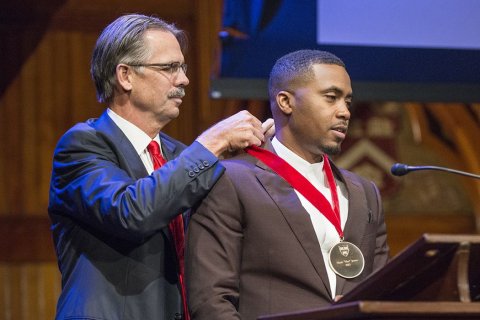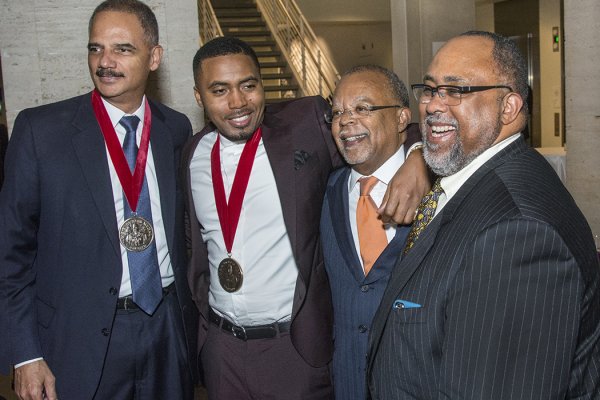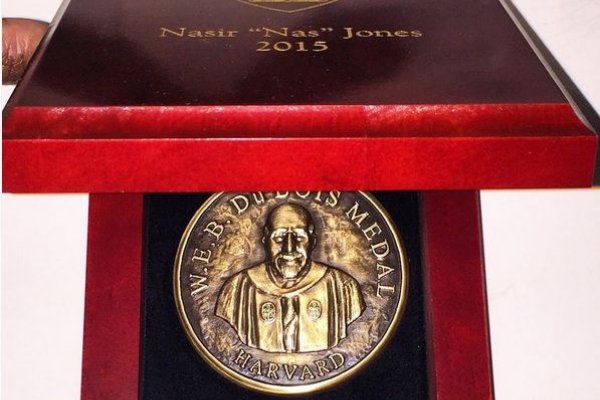

It is my honor to present the W. E. B. Du Bois Medal to legendary hiphop artist, Nasir Jones, known to the world simply as Nas - Part Poet. Part Entrepreneur. Part Intellectual. Part Metaphysician. And Wordsmith -

Nas is widely considered one of the greatest Hiphop artists of ALL TIME. When we recall that hiphop began in the early 1970s, in economically depressed areas of metropolitan New York, “all time” assumes a significance that isn’t empty boasting: hiphop has a history, and Nas is a major part of it.
Illmatic was Nas’s first album, released in 1994 to near-universal critical acclaim. The Source magazine awarded Illmatic a rare five mics, the highest rating possible. Harvard philosopher Tommie Shelby writes that at the age of 18, Nas presented an uncanny mix of politically conscious lyrics juxtaposed with an honest hard-core sensibility. The Village Voice also gave him serious praise, calling him “one of the most important writers of the 20th century.”
Nas is a phenomenally successful artist, having amassed eight consecutive platinum and multi-platinum records - having sold over 25 million records worldwide since 1994. His albums are lyrical ethnographies, wherein the plight of urban life is simultaneously chastised and romanticized. His lyrics go beyond autobiography to explore politics, family, religion, and race, and his music draws on jazz and other music styles.
Whether it is from his father Olu Dara, a successful jazz and blues trumpeter, or the pounding bass from the boomboxes outside in the courtyards of the Queensbridge housing projects of his youth, music was a central component of Nas’s upbringing from early on. Combine that with a love of language and books, instilled in him by his father, it is easy to see how the young Nas was destined to become an intellectual at heart. His world was one of extreme incongruities—the coldness of the streets vis-à-vis the warmth of his mother’s love; life as a middle-school dropout juxtaposed against recognition in the power of words and ideas to escape the harsh realities of life in Queensbridge. Yet, it was his ability to navigate these incongruities with a critical consciousness that resonates so loudly in his music and his work.
Nas’s relationship with Harvard began before today. This campus is full of Nas philosophers, musicians, educators, scientists, athletes historians, writers and more who quote his lyrics and are energized to work at the highest possible level and to build the world we want, need and deserve. In 2014, an anonymous donor funded the Nasir Jones Hiphop Fellowship at the Hiphop Archive & Research Institute at the Hutchins Center. The fellowship allows us to bring people to the Hiphop Archive who are doing work that has to do with the ways hiphop itself reaches out to youth throughout the world, and particularly how it brings together issues of social justice, art, and politics.
In another connection with Harvard, Elisa New of the Department of English has prominently featured Nas in work she’s doing on poetry for American teachers with the Graduate School of Education, and he will be the focus of a WGBH episode of her Poetry in America.
Nas’ commitment to stay true to his worldview is extraordinary in popular culture. However, as important as his message is, Nas layers his lyrics with spirituality, challenging one to think even further to uncover the meaning behind his rhymes. There is no silver platter—you cannot grasp his message in a passive listen.
One of the most striking moments in the film Time Is Illmatic, which was released on the twentieth anniversary of the album and gives us rich images to fill out the story told on that classic album, is when the film ends with Nas walking through the door of the Hiphop Archive. This “arrival” illustrates what the film’s producer, Erik Parker, said: “It’s an amazing story that showed us that Nas’s journey isn’t just about music. It’s an American story.”
This multifaceted artist is still on that journey, and we will go along with him. It is my great honor to present the W. E. B. Du Bois Medal to Nasir Jones.

